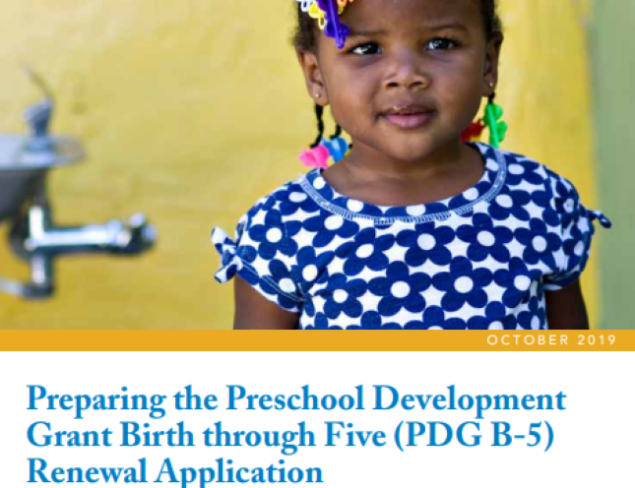Preschool Development Grants Birth through Five (PDG B-5)
The 2024 Preschool Development Grant Birth through Five (PDG B-5) grants are available to states and territories to support early childhood services for children birth to age five. Funds support a needs assessment, strategic planning, family engagement, quality improvement, workforce compensation and supports, and direct services for young children.
UPDATED Resources to support leaders writing for the new grant application in 2024.
- Learning from 2023 PDG B-5 Systems Building Grants
- Ideas for Incorporating Strategic Financing Efforts into Your PDG B5 Application
- Highlighting Infants and Toddlers in Your PDG B-5 Application: Resources from ZERO TO THREE
- CELFE and Children’s Funding Project PDG Webinar | Center for Early Learning Funding Equity
- PDG Grant Renewal Process Support – Afton Partners
2022 Preschool Development Grant B-5 Application Preparation: National TA Collaborative to Maximize Early Childhood Investments Webinar

Application Resources
In 2018 and 2019, BUILD and the Policy Equity Group produced guides to writing the PDG B-5 application and renewal application that remain relevant and useful today. The major difference between the older applicants and the current ones are the context of COVID, federal recovery and stimulus dollars, and the increased awareness of racism and the growing anti-racist movement. This makes the needs assessment all the more important in 2022 and the approach of centering the voices of families, community members, and providers to understand this new context. The 2022 applications have a huge workforce emphasis as a result of the changed context and the renewal grant application has some focus on direct delivery of services as well.
Additional PDG B-5 Resources
(following approx. order of FOA topics)
Program Approach
- Early Childhood Workforce
- Compensation Initiatives for Child Care
- Mentoring, Coaching, and Professional Development for PDG B-5 Workforce
- Scholarships and Other Resources to Support Credentials/Degree Attainment
- Career development across the mixed delivery system (including infants & toddlers)
- Child Care Health Consultant Workforce
- Health Supports, Mental Health for Early Childhood Workforce
- Promoting an Integrated B-5 ECCE System (Including Schools, Health Care)
- ECCE Program Sustainability
- Community and Family Engagement and Leadership in Planning and Implementation
- Inclusion of Children With, or at Risk of, Disabilities in ECCE Programs
- Eliminate Suspensions, Expulsions, and Other Exclusionary Practices
- Trauma-informed Approaches
- Coordinated Outreach, Application, Eligibility, and Enrollment System
- Build On and Align with Child Care and Development Fund to Stabilize CC Workforce and Services
- Transitions Between and Across Programs
- Build Infant-toddler Care Capacity
- Provide Services to Underserved Children
Program Activities
- Update/Create B-5 Needs Assessment
- Update/Create B-5 Strategic Plan
- Maximize Parent and Family Engagement in the B-5 System
- Support the B-5 Workforce/Disseminate Best Practices
- Support Program Quality and Improvement
- Improving State’s Data Infrastructure
- Subgrants to Enhance Quality and Expand Access to Existing and New Programs
